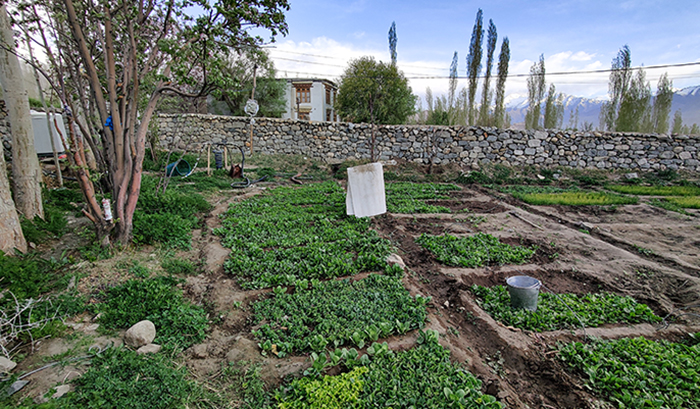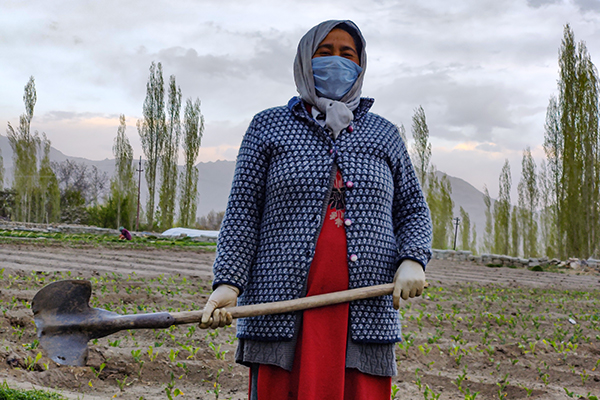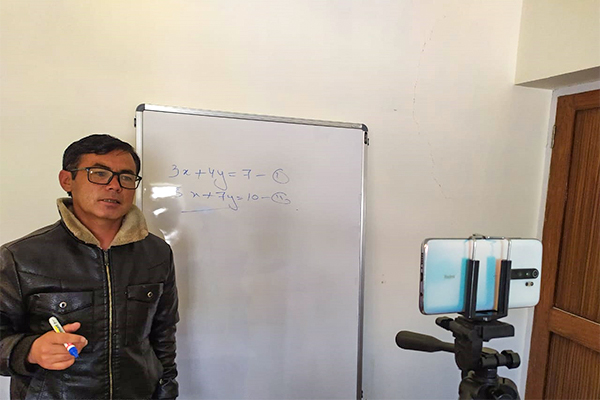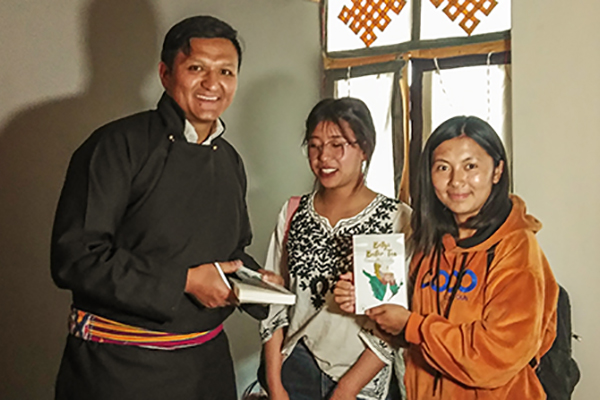There is a Ladakhi saying that a man is tested by his words and a horse is tested by its first three steps. I would qualify this further to say that a farmer is tested by the wear and tear of their spade. And, in Ladakh such a saying is best exemplified by women, who generally wield the spade.
This insight struck me when I met Achey Zenab Parveen. She welcomed us with a worn-out spade on her shoulder as she spoke about the joys of farming. I met Achey Zenab when I accompanied a friend who was driving over to Saboo village, which is about eight kms from Leh town, to collect saplings. It was a beautiful spring evening with a hint of cold winds. The orange sky was dotted with grey clouds that mirrored the emerging greenery on the ground. When we met Achey Zenab, she was plucking onion and cauliflower saplings that she was preparing for a lady waiting to collect them. I was fascinated as she recounted her journey from a newly-wed bride to a successful agri-preneur who successfully balances her responsibilities. She was a breath of fresh air in a world saturated by overhyped corporate careers.
Zenab Parveen was married in 1999. She was inspired to take up farming by her father-in-law, Haji Ghulam Rasool. He used to grow vegetables and run an agri-based business. The farm would produce vegetables for the family and what was surplus was sold to the army or in the market. Achey Zenab explained, “My father-in-law would say that vegetables never go waste because they always sell due to food shortages. He would take great pride in the fact that we are able to grow our own food.” Following in his footsteps, Achey Zenab started experimenting with new crops and methods to see what grows well. This experimentation resulted in the development of a nursery that generates an annual income of more than three lakhs (INR 300,000). She has emerged as a leading figure in the agriculture sector in Leh, especially as a supplier of saplings at the start of the agricultural season. Her customers are drawn from Leh town and areas around it who flock to her nursery in Saboo to buy saplings of vegetables and flowers.
I was very interested in knowing how climate change has impacted agriculture in Ladakh. Achey Zenab explained, “We were not able to grow many vegetables till some years back. Many of these varieties reached Ladakh with the arrival of Moravian Missionaries who introduced potatoes and other vegetables. Since then, we Ladakhis have been experimenting with different vegetables. At times, people say that there is no future in agriculture. I say we need to keep experimenting. With a changing climate, I am able to grow more varieties of vegetables than my father-in-law. Till 20 to 30 years back, we were only able to grow barley, turnips and potatoes. Now we can grow almost everything that is grown in the plains of India.”
In order to ensure that the food is healthy, Achey Zenab minimises the use of urea. However, she is honest in admitting that many plants do not grow without a little fertiliser. She won my respect with her honesty and for resisting ‘green-washing’. She explained, “I bought around 40 to 50 bags of chicken droppings and cattle manure as I had heard that they were good for plants. I sprinkled a thin layer of this mix in every plant bed.” As she spoke, she dug the soil and plucked out the onion sapling to show me the droppings in the multi-layered manure below the soil surface.
I wondered about how she managed to water her farm. Achey Zenab explained, “Till water starts to flow in the streams, we use water from the bore-well. Once we get water in the streams, we use it as it is much better for the crops than water from the bore-well. The soil hardly retains water from the bore-well as compared to stream water. Also, people have told me that there is a slight difference in taste for vegetables grown with stream water as compared to bore-well water.”

When I asked Achey Zenab about popular plants, she got up and said, “Onions. I have around 100 beds dedicated to onions, which are purchased by the army as well as shopkeepers.” She explained that she has more than 200 beds in her nursery between February and May. Since February is still cold in Ladakh, I wondered how she managed to grow the saplings. She replied that she uses mulching sheet when she sows seeds as it helps maintain moisture and heat till the seeds sprout. After that, she uses a low tunnel-style greenhouse till the end of March. Finally, she removes the saplings when they are ready for sale. She also explained that the weather fluctuates a lot in the spring and many plants like cauliflower are not able to adapt to such variations. Later, she uses the same beds to grow her own vegetables till the end of October. When asked about her favourite vegetable, she said without hesitation and a glowing smile, “Hag-sag (Kale family of collard greens)! It is tasty, easy to grow and is very popular. Even its seeds are in high demand. My family hardly buys leafy vegetables from the market as it takes a long time to cook and it’s tasteless.”
When I asked her about variety of crops that grow in her farm and kitchen garden, Achey Zenab’s eyes started shining with excitement. She said, “I grow most varieties of cauliflower, cabbage, potatoes, capsicum, brinjal (eggplant), collards, chards, tomatoes, chilly, spinach, carrots, suede, onion and local radish. It feels nice to have a variety of vegetables at home at a time when processed and packaged food items dominate our diet.”
Even as we were speaking, she kept receiving calls from people who wanted to buy saplings. She is now assisted by a Nepali couple by the name of Puran and Komal. Puran was busy preparing bundles for a client who wanted more than 100 onion saplings that evening. Komal was collecting coriander from the polythene-covered greenhouse. Achey Zenab’s son helps her with accounts and client management. Her husband helps in transporting vegetables and with de-weeding whenever he gets time from his transport business. Achey Zenab too delivers vegetables when the quantity is low or if there is no alternative. In the evening, her sister, who is following in Achey Zenab’s footsteps, comes over from Thiksey with her two sons to help. Achey Zenab also sells tomato puree and sugar-free apple juice from raw materials that she grows herself.
I noticed various flowers around her home and asked her about them. She explained, “Those are Phlox and Godetia that has six to seven different colour-types. They are in high demand.” She explained that there is a lot of demand for flower saplings in Ladakh as people prefer them to bouquets. She said that there are 50 types of flowers but only a few of them are for sale.
She remains a shining example of an independent person. Her success as an entrepreneur has been recognised by different organisations. Most recently, she was awarded the prestigious Kisan Mitra at a national-level farmer’s meet in Jodhpur, Rajasthan by ICAR-CAZRI. She has been receiving such awards since 1995 and remains a torchbearer in the field of entrepreneurship. She has also been an important voice in Ladakh who has helped break stereotypes about agriculture. She loves her work and remains very popular in the agriculture sector. In fact, the Director of CAZRI always makes it a point to visit her farm when he is in Ladakh. Similarly, many other scientists from across the country visit her farm to consult her on various matters.
In the context of this experience, I could not help but wonder about her vision for the future of agriculture. She replied, “If one can persevere, agriculture and farming is a great way to be independent, generate an income, and produce your own food. People will never stop eating food and so you can keep selling it. Unfortunately, today’s generation are hesitant to take up agriculture-related work as it requires a lot of hard work, patience and commitment.”
Photographs and text by Namgyal Angmo
Namgyal Angmo is an avid collector of stories of people’s lives and experiences.



